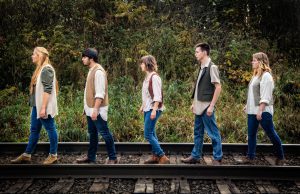 displace: Refugee Stories in Their Own Words
displace: Refugee Stories in Their Own Words
Director: Angela Konrad
Cast: Uliana Akulenko, Emmett Hanly, Keenan Marchand, Kate Nundal, and Jane Oliphant
A production of Dark Glass Theatre, in conjunction with Humanitas Anabaptist-Mennonite Centre
Trinity Western University, Langley, B.C.
Nov. 22–Dec. 3, 2016
Stories transport people to different places and times, and help people understand different points of view and emotions. Through theatre – the enactment of stories – Dark Glass Theatre at Trinity Western University aims to increase empathy and reduce the labels that we impose on other people. disPLACE: Refugee Stories in Their Own Words is their first production.
The play presents several word-for-word accounts of real people’s refugee experiences before and after arriving in Canada.
First, the action transports the audience more than 2,000 years back to Bethlehem, where Mary and Joseph are trying to find a place to stay. We see the couple exhausted, begging the innkeeper for a place to lay their heads. At the same time as we watch, one actress recites today’s questions and excuses about why we need not help those fleeing from violence in their countries. These excuses linger and cut deep as we hear stories of people who fled from their homes seeking security in Canada.
Maria stands in the spotlight. A Mennonite who flees Russia and finds a way to Canada, she conveying the passion of her story through her face and her tone.
Next, we are in the present day: a war rages around Nika in Syria; fighting for human rights in the Democratic Republic of the Congo puts Emanuel’s life in danger; Eduardo’s life is threatened in Colombia before he arrives in Canada in 2003.
The last stop on the harrowing journey is Iraq, where we have a glimpse of how Nasira’s family is affected by war.
We go back and forth to each character and hear more of their stories from their corner of the stage.
One of the most powerful parts of the production was each person’s experience when they arrived in Canada.
Nika’s story particularly moved me. Her family travel from Syria to Lebanon, then Lebanon to Canada. They are so excited when they find out they are going to Canada that they forget to ask where exactly in Canada they will be living. When they arrive at the airport, there are more than 20 people to greet them and they feel the welcome.
What do these stories mean for those living here in Canada? How are we responding to the world around us? The message I received loud and clear is that the simplest thing – even a smile – can help our new neighbours to feel welcome and safe.
It is hard to put into words the emotions flowing through the theatre over the 90 minutes. Interspersed between these stories that few of us can even begin to understand, the beat of the drum, a haunting violin, guitars and the melodic voices of the actors aided in the journey to empathy.
At the beginning of the production, the actors acknowledged that they are not refugees and are privileged to share these stories. At the performance I attended, most of the people whose stories were told were present and the actors met them for the first time. There were tears on both sides and this moment showed how incredibly special it was that these stories could be shared.
Dark Glass’s disPLACE: Refugee Stories in Their Own Words helped me to see more clearly that each refugee has their own unique experience, and that it is important to listen to their stories and not just label them. Through my current studies to be a teacher, we have had many conversations about how to best help students who are refugees. As I continue on my journey, I hope to remember to see each person as an individual and take the time to get to know them.
—Brianna Janz is a member of King Road MB Church, Abbotsford, B.C. She is currently in the bachelor of education program at the University of the Fraser Valley and is excited about becoming an elementary teacher.
“disPLACE” is part 3 of a three-part series on the (past) Mennonite and present refugee experience
This series was planned by Humanitas Anabaptist-Mennonite Centre (TWU) in collaboration with the Peace and Conflict Studies Program (UFV) and with help from MCC and others. (The PACS at UFV was an initiative of the Mennonite Faith and Learning Society).
“Refuge/e and Be/Longing: A Shared Migration: Poetry, Photography and Art”
- a presentation by Connie T. Braun, poet & author & instructor in Creative Writing.
- Oct. 28 at Mennonite Heritage Museum
An evening of poetry & prose, photography & art about the refugee and refuge, longing and belonging. Experiences from the shared Mennonite migration story are brought into poetic and artistic conversation with the Canadian newcomer story today. On exhibition will be a collection of photographs by Erik Braun (BFA): “Survivors of a Violent History (WWII)” and a collection of artwork by refugees: “Stories in Art from Iraqi Kurdistan.”
“Present-Day Newcomers Fleeing War Torn Regions: Receptivity and Integration”
- Nov. 2 at University of Fraser Valley
This event, featuring a panel of experts, focuses on local work in refugee settlement and integration, particularly by highlighting the work of numerous local non-profit organizations. Attendees will learn about the experiences of refugees: their journey from far-off war-torn lands to Abbotsford; their experiences upon arrival in Canada, particularly their encounters with Canadian government personnel and civilians; and their experiences in the integration process in the Fraser Valley. Presentations interspersed with poetry readings by Connie Braun.
